高一英语教案:必修一 专项复习
- 格式:doc
- 大小:121.00 KB
- 文档页数:11
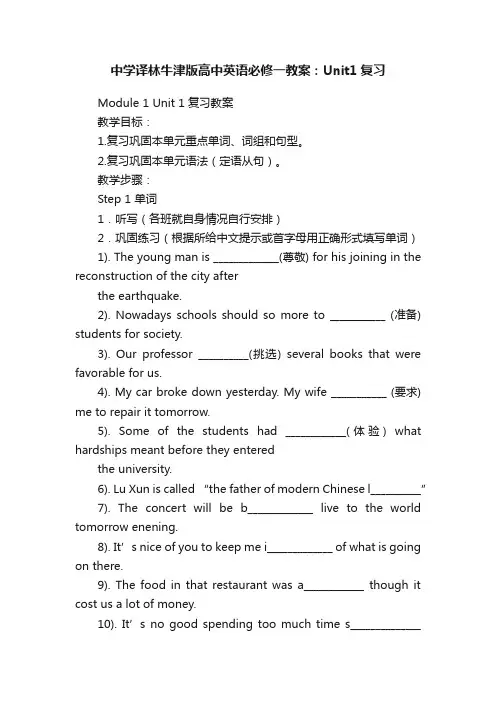
中学译林牛津版高中英语必修一教案:Unit1复习Module 1 Unit 1 复习教案教学目标:1.复习巩固本单元重点单词、词组和句型。
2.复习巩固本单元语法(定语从句)。
教学步骤:Step 1 单词1.听写(各班就自身情况自行安排)2.巩固练习(根据所给中文提示或首字母用正确形式填写单词)1). The young man is _____________(尊敬) for his joining in the reconstruction of the city afterthe earthquake.2). Nowadays schools should so more to ___________ (准备) students for society.3). Our professor __________(挑选) several books that were favorable for us.4). My car broke down yesterday. My wife ___________ (要求) me to repair it tomorrow.5). Some of the students had ____________(体验) what hardships meant before they enteredthe university.6). Lu Xun is called “the father of modern Chinese l__________”7). The concert will be b_____________ live to the world tomorrow enening.8). It’s nice of you to keep me i_____________ of what is going on there.9). The food in that restaurant was a____________ though it cost us a lot of money.10). It’s no good spending too much time s______________the Internet.Step 2 短语1.书后词汇表短语及重要单词拓展短语1参加集会attend assembly 2谋生earn one’s living3尊重某人respect sb / show respect for sb 4因某事尊重某人respect sb for sth 5平均水平on the/an average 6平均水平之上/下above / below the average 7准备做某事prepare to do sth 8为某事做准备prepare / make preparations for sth 9错过做某事miss doing sth 10在做某事方面有经验have experience in doing sth 11向某人介绍某人introduce sb to sb 12 向某人捐赠某物donate sth to sb 13注意pay attention to sb 14需要做某事(主动表被动) require doing / to be done 15很遗憾地要做regret to do sth 16 通知某人某事inform sb of sth 17批准某人某事approve sb of doing sth 18继续做某事continue to / doing sth 19要求某人做某事require sb to do sth 20后悔做了某事regret doing sth 2. Reading & Project 部分重要短语1比平时晚一个小时起床get up an hour later than usual 2对…满意be happy with 3获得尊重的最好的方式the best way to earn respect 4获得高分achieve hige grades 5听起来像sound like 6过去常常used to do sth7习惯于做某事be used to doing sth 8被用来做某事be used to do sth 9起初at first / first of all 10进步很大improve a lot 11花…做… spend … on/ doing sth 12在午饭时间at lunchtime 13免费for free / free of charge 14在学期末at the end of term 15在学校操场上on the school field 16在休息期间during break time 17经历不同的生活方式experience different way of life 18如此…以至于… so… that…19对…感兴趣be interested in doing sth 20上网冲浪surf the Internet 21有机会做某事have chances to do sth 22允许某人做某事allow sb to do sth 23想要做某事would like to do / feel likedoing 24不仅仅more than 25播放由学生唱的歌play songs sung by students 26大声朗读… read sth out loud 3. 课本其它部分重要词组1舒适的,自在的at ease 2直行go straight on 3可得到的be available for 4远离far away from 5在校园里on campus 6毕业于graduate from 7邀请某人做某事invite sb to do sth 8 一…就… upon / on doing 9关于某事做演讲make a speech about sth 10难以取悦hard to please 11取代做某事instead of doing sth 12发生take place 13越…越…the 比较级,+ the 比较级14轮流做某事take turns to do sth 15以简短形式来节省空间in short form to save space4. 巩固练习(根据中文提示完成句子,每空一词)1). This TV doesn’t work. It ___________ _____________. (需要修了)2). We had some __________ _________ __________ ___________ American and British high schools in the last summer vacation. (有机会了解)3). _________ ___________ his homework, the boy went to play football. (一完成家庭作业)4). I would achieve higher grades if I _________ __________ _______ to the rules and requirements. (注意)5). This boy ________ ________ be skinny and weak, but now he is becoming fit and strong.( 过去曾经)6). Students are examined in all subjects _______ _______ ________ ________ each term.(在每学期末)7). What I ______ _______ ______ at university is the flexible timetable, which gives me morefree time. (满意)8). After attending university I found that the homework wasnot ______ ________ _______what I used to get in senior high school. (和…一样繁重)9). If you want to _______ _________ __________ others, you must respect others first of all.( 得打尊重)10). _______ __________ ________ _____ lose weight is to have s healthy diet and takeregular exercise. ( 最好的减肥方法)Step 3 句型1. Going to a British high school for one year was a very enjoyable and exciting experience for me. 句中going to a British high school for one year是动名词短语,作主语。
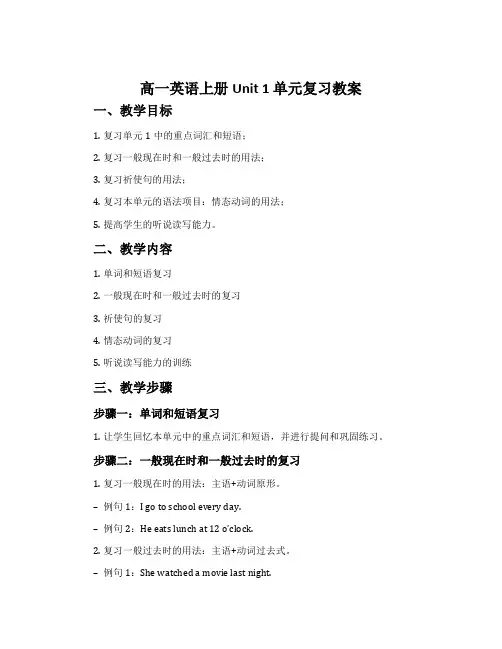
高一英语上册Unit 1 单元复习教案一、教学目标1.复习单元1中的重点词汇和短语;2.复习一般现在时和一般过去时的用法;3.复习祈使句的用法;4.复习本单元的语法项目:情态动词的用法;5.提高学生的听说读写能力。
二、教学内容1.单词和短语复习2.一般现在时和一般过去时的复习3.祈使句的复习4.情态动词的复习5.听说读写能力的训练三、教学步骤步骤一:单词和短语复习1.让学生回忆本单元中的重点词汇和短语,并进行提问和巩固练习。
步骤二:一般现在时和一般过去时的复习1.复习一般现在时的用法:主语+动词原形。
–例句1:I go to school every day.–例句2:He eats lunch at 12 o’clock.2.复习一般过去时的用法:主语+动词过去式。
–例句1:She watched a movie last night.–例句2:They played basketball yesterday.3.练习填空题,使用一般现在时或一般过去时填空。
步骤三:祈使句的复习1.复习祈使句的用法和结构:动词原形+其他。
–例句1:Close the window, please.–例句2:Don’t be late for class.2.练习完成句子,使用正确的祈使句来表达。
步骤四:情态动词的复习1.复习情态动词的用法和意义。
–例句1:You should study harder.–例句2:They can’t go to the party tonight.2.练习选择题,选择正确的情态动词填空。
步骤五:听说读写能力的训练1.听力练习:播放录音并让学生回答问题。
–例题1:What did she do last weekend?–例题2:Where does he live?2.口语训练:进行口语对话练习,让学生在实际情境中运用所学知识。
3.阅读训练:让学生阅读与本单元相关的文章,理解文章主旨和细节。
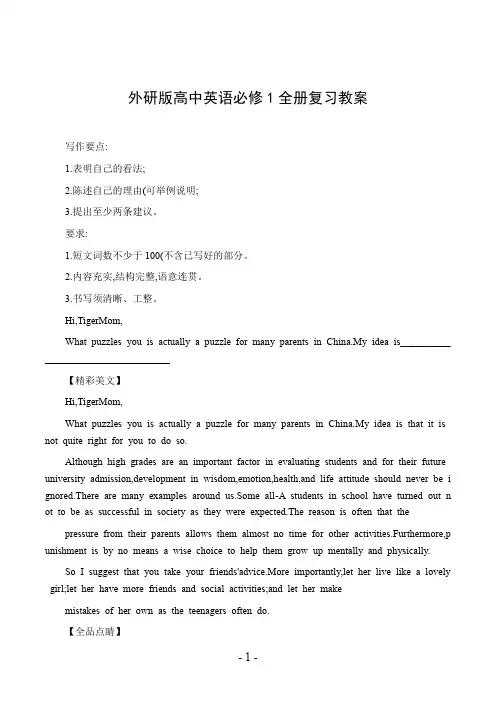
外研版高中英语必修1全册复习教案写作要点:1.表明自己的看法;2.陈述自己的理由(可举例说明;3.提出至少两条建议。
要求:1.短文词数不少于100(不含已写好的部分。
2.内容充实,结构完整,语意连贯。
3.书写须清晰、工整。
Hi,TigerMom,What puzzles you is actually a puzzle for many parents in China.My idea is__________ _________________________【精彩美文】Hi,TigerMom,What puzzles you is actually a puzzle for many parents in China.My idea is that it is not quite right for you to do so.Although high grades are an important factor in evaluating students and for their future university admission,development in wisdom,emotion,health,and life attitude should never be i gnored.There are many examples around us.Some all-A students in school have turned out n ot to be as successful in society as they were expected.The reason is often that the pressure from their parents allows them almost no time for other activities.Furthermore,p unishment is by no means a wise choice to help them grow up mentally and physically.So I suggest that you take your friends'advice.More importantly,let her live like a lovely girl;let her have more friends and social activities;and let her makemistakes of her own as the teenagers often do.【全品点睛】①行文逻辑:提出观点→解释原因→给出建议。
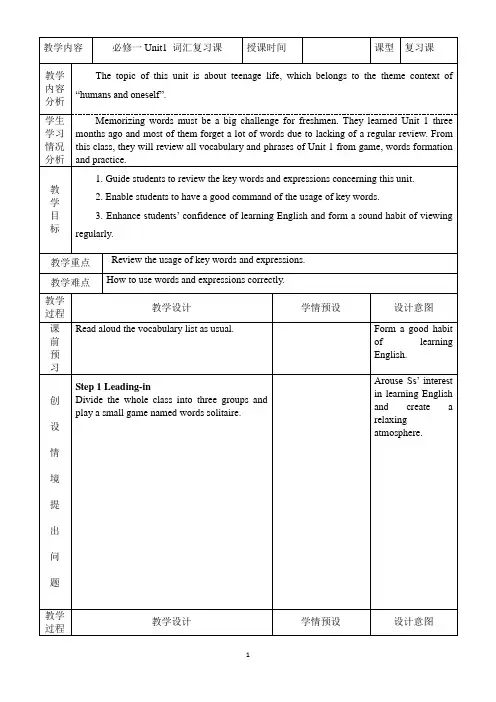
教学内容必修一Unit1词汇复习课授课时间课型复习课教学内容分析The topic of this unit is about teenage life, which belongs to the theme context of “humans and oneself”.学生学习情况分析Memorizing words must be a big challenge for freshmen. They learned Unit 1 three months ago and most of them forget a lot of words due to lacking of a regular review. From this class, they will review all vocabulary and phrases of Unit 1 from game, words formation and practice.教学目标1. Guide students to review the key words and expressions concerning this unit.2. Enable students to have a good command of the usage of key words.3. Enhance students’ confidence of learning English and form a sound habit of viewing regularly.教学重点Review the usage of key words and expressions.教学难点How to use words and expressions correctly.教学过程教学设计学情预设设计意图课前预习Read aloud the vocabulary list as usual.Form a good habitof learningEnglish.创设情境提出问题Step 1 Leading-inDivide the whole class into three groups andplay a small game named words solitaire.Arouse Ss’ interestin learning Englishand create arelaxingatmosphere.教学过程教学设计学情预设设计意图师生探索构建新知Step 2 PresentationVocabulary FormationVerbs——NounsVerbs/Nouns——adjectivesAdjectives——Adverbials词性转化是学生学习词汇的难点,存在词性混乱,背了也不知怎么用等困难。
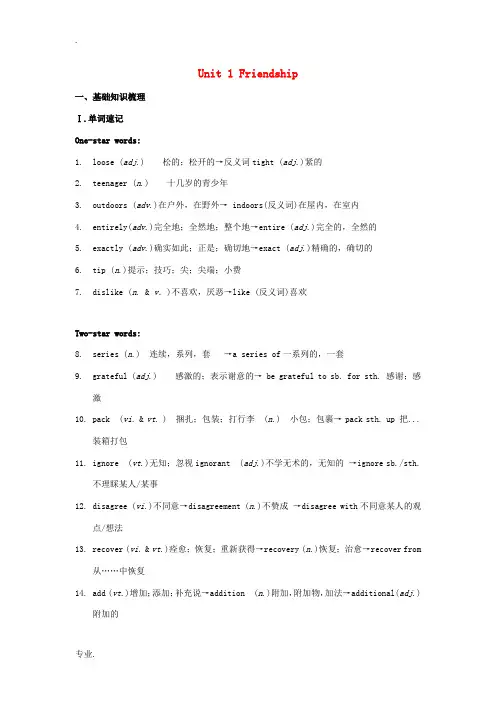
Unit 1 Friendship一、基础知识梳理Ⅰ.单词速记One-star words:1.loose (adj.) 松的;松开的→反义词tight (adj.)紧的2.teenager (n.) 十几岁的青少年3.outdoors (adv.)在户外,在野外→ indoors(反义词)在屋内,在室内4.entirely(adv.)完全地;全然地;整个地→entire (adj.)完全的,全然的5.exactly (adv.)确实如此;正是;确切地→exact (adj.)精确的,确切的6.tip (n.)提示;技巧;尖;尖端;小费7.dislike (n. & v.)不喜欢,厌恶→like (反义词)喜欢Two-star words:8.series (n.) 连续,系列,套→a series of一系列的,一套9.grateful (adj.) 感激的;表示谢意的→ be grateful to sb. for sth. 感谢;感激10.pack (vi. & vt. ) 捆扎;包装;打行李 (n.) 小包;包裹→ pack sth. up 把...装箱打包11.ignore (vt.)无知;忽视ignorant (adj.)不学无术的,无知的→ignore sb./sth.不理睬某人/某事12.disagree (vi.)不同意→disagreement (n.)不赞成→disagree with不同意某人的观点/想法13.recover (vi. &vt.)痊愈;恢复;重新获得→recovery (n.)恢复;治愈→recover from从……中恢复14.add (vt.)增加;添加;补充说→addition (n.)附加,附加物,加法→additional(adj.)附加的15.settle (vt.&vi.)使定居;安排,解决→settlement (n.)殖民,定居,解决→settledown稳定;定居;舒适地坐下;平静下来;专心做16.power (n.)能力;力量;权力→powerful(adj.)强大的,强有力的→powerless (adj.)无力的;无能的Three-star words:17.upset(adj.) 心烦意乱的;不安的;不适的 (vt.) 使不安;使心烦18.calm_(adj.)平静的;镇静的;沉着的 (vt. &vi.)(使)平静;(使)镇定→_cal mly (adv.)安静地,冷静地19.concern (vt.)涉及;关系到 (n.)关心;关注→ concerned (adj.)有关的,忧虑的,担心的→concerning prep.关于;就……而论20.suffer (vt. & vi.)遭受;忍受;经历→suffering (n.)痛苦,苦恼Ⅱ.短语互译1.add up 合计2.calm down (使)平静下来;(使)镇定下来3.be concerned about 关心;挂念4.go through 经历;经受;完成;仔细检查5.set down 记下;放下;登记6.a series of 一连串的;一系列;一套7.on purpose 故意地;有目的地8.be upset about 为……心烦意乱9.face to face 面对面地10.suffer from 遭受;患病11.get/be tired of 对……厌烦12.pack(sth.) up 将(东西)装箱打包13.get along with 与……相处;进展14.fall in love (with) 相爱;爱上15.join in 加入16.in order to 为了...Ⅲ.典句析练1.状语从句的省略(while+分词结构)While walking the dog (遛狗时), you were careless and it got loose and was hit by a car.[仿写] 当孙杨被问及他成功的秘密时,他说他的成功很大程度上归功于他的父母。
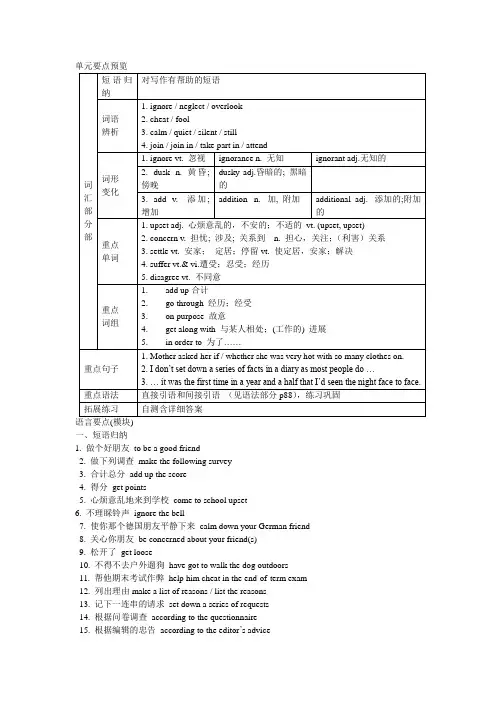
单元要点预览一、短语归纳1. 做个好朋友to be a good friend2. 做下列调查make the following survey3. 合计总分add up the score4. 得分get points5. 心烦意乱地来到学校come to school upset6. 不理睬铃声ignore the bell7. 使你那个德国朋友平静下来calm down your German friend8. 关心你朋友be concerned about your friend(s)9. 松开了get loose10. 不得不去户外遛狗have got to walk the dog outdoors11. 帮他期末考试作弊help him cheat in the end-of-term exam12. 列出理由make a list of reasons / list the reasons13. 记下一连串的请求set down a series of requests14. 根据问卷调查according to the questionnaire15. 根据编辑的忠告according to the editor’s advice16. 为了分担你的困难in order to share your difficulties / troubles17. 与老板相爱fall in love with the boss18. 与我的同桌相处融洽get along / on well with my deskmate19. 关心青少年be concerned about teenagers20. 为了和老板面对面地交流in order to communicate with the boss face to face21. 信任政府trust / believe in the government22. 经历了太多的战争go through too many wars23. 相邻的城镇neighboring towns24. 相邻的国家neighboring countries二、.词语辨析四.重点词汇1. upset adj. 心烦意乱的,不安的;不适的vt. (upset, upset)[典例]1). Our arrangements for the weekend were upset by her visit. 她一来把我们周末的安排给打乱了。
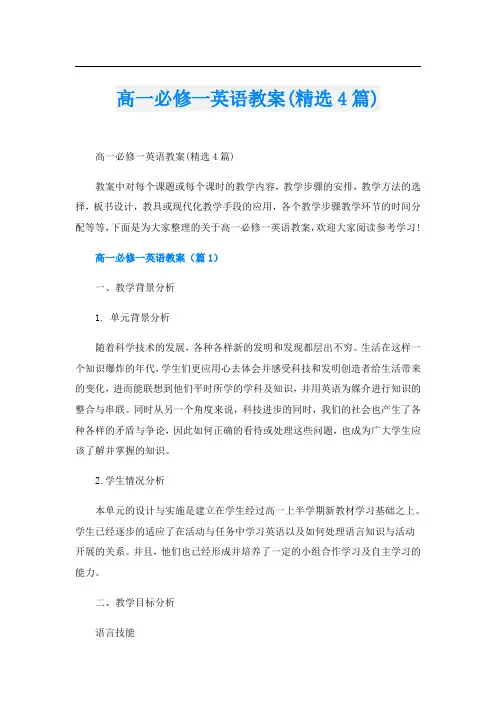
高一必修一英语教案(精选4篇)高一必修一英语教案(精选4篇)教案中对每个课题或每个课时的教学内容,教学步骤的安排,教学方法的选择,板书设计,教具或现代化教学手段的应用,各个教学步骤教学环节的时间分配等等,下面是为大家整理的关于高一必修一英语教案,欢迎大家阅读参考学习!高一必修一英语教案(篇1)一、教学背景分析1. 单元背景分析随着科学技术的发展,各种各样新的发明和发现都层出不穷。
生活在这样一个知识爆炸的年代,学生们更应用心去体会并感受科技和发明创造者给生活带来的变化,进而能联想到他们平时所学的学科及知识,并用英语为媒介进行知识的整合与串联。
同时从另一个角度来说,科技进步的同时,我们的社会也产生了各种各样的矛盾与争论,因此如何正确的看待或处理这些问题,也成为广大学生应该了解并掌握的知识。
2.学生情况分析本单元的设计与实施是建立在学生经过高一上半学期新教材学习基础之上。
学生已经逐步的适应了在活动与任务中学习英语以及如何处理语言知识与活动开展的关系。
并且,他们也已经形成并培养了一定的小组合作学习及自主学习的能力。
二、教学目标分析语言技能听:在听懂教师向学生讲述实验中注意事项基础上,继续学习并强化捕捉特定信息的能力,以及确定全文主要话题的概括能力。
说:应能在了解一定的现代科技发明基础上,思考并学习如何对一种新的事物进行描述。
同时能与他人进行交流,叙述事物的利与弊端。
读:强化略读、查读等阅读微技能,训练通过寻找关键词,主题句等方式更快速并准确的确定*的段落大意,理清*的总体框架与脉络。
继续运用已经掌握的基本猜词技巧猜测部分单词,并在上下文体验中感受某些佳句给读者带来的深层含义。
写:学习在对事物进行理性思考的基础上,运用恰当的句型与词汇描述对事物正反面的不同观点,同时更应注重掌握一些必要的过渡词增加此类写作的条理性与层次感,并应熟悉议论性作文的基本写作框架。
情感态度与文化意识(1)。
进一步培养小组合作学习的能力,通过调查、采访、讨论等活动完成任务,取长补短,加强团体协作意识。
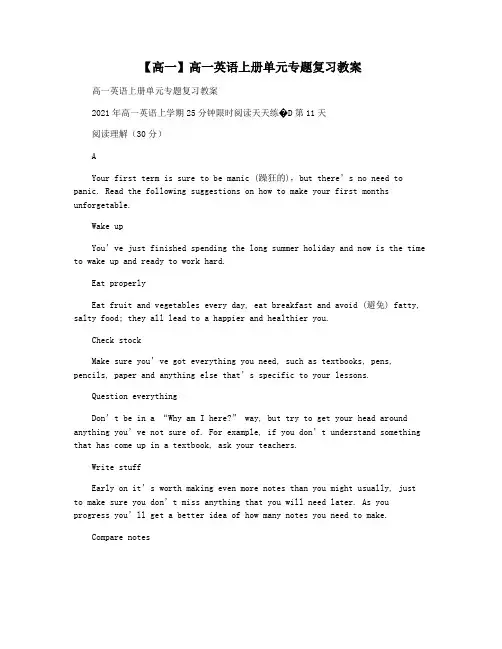
【高一】高一英语上册单元专题复习教案高一英语上册单元专题复习教案2021年高一英语上学期25分钟限时阅读天天练�D第11天阅读理解(30分)AYour first term is sure to be manic (躁狂的),but there’s no need to panic. Read the following suggestions on how to make your first months unforgetable.Wake upYou’ve just finished spending the long summer holiday and now is the time to wake up and ready to work hard.Eat properlyEat fruit and vegetables every day, eat breakfast and avoid (避免) fatty, salty food; they all lead to a happier and healthier you.Check stockMake sure you’ve got everything you need, such as textbooks, pens, pencils, paper and anything else that’s specific to your lessons.Question everythingDon’t be in a “Why am I here?” way, but try to get your head around anything you’ve not sure of. For example, if you don’t understand something that has come up in a textbook, ask your teachers.Write stuffEarly on it’s worth making even more notes than you might usually, just to make sure you don’t m iss anything that you will need later. As you progress you’ll get a better idea of how many notes you need to make.Compare notesOnce you have made those notes, why not discuss them with your classmates? It’s a good way to get to know them better and make sure you haven’t missed anything in the process.Get involved (参与)When you sign up for all those clubs, don’t forget to go along to them! This is a chance to meet new people and learn new things._________Let friends and relative s know how you’re getting on, while it’s also good to hear from the people you love. However, don’t go home on your first weekend if you live at the school; settle in your new surroundings first.1. The underlined word “panic” in Paragragh 1 can be replaced by “_____”A. be enthusiasticB. be disappointedC. be amazingD.be afraid andanxious2. What’s the writer’s purpose of giving suggestions to the new students?A. to make them eat properly.B. to make them make as many notes as possible.C. to make their first term memorable and colorful.D. to tell them to campare notes with their classmates.3. What does the underlined word “It” in Paragraph 7 refer to?A. to get to know your lessons better.B. to discuss your notes with your classmates.C. to make sure you have’t missed anything in the process.D. to makeyour notes.4. Which of the following can be filled in the blank of Paragragh 9?A. Phone home.B. Eat out.C. Go home.D. Make friends.BQ:I’d like to know about fluency. What can I do to feel better when I’m talking to other people? Do you have some ways to learn it faster? Please help me!---Roberto in BrazilA:Roberto wants to know how to become more fluent in English, and this is something you want to be able to do “fast”.First, if you get to meet English speakers much, the important rule is to listen not just to native speakers of English, but aslo to very good users of English. If you don’t, then listen to the radio, TV or films in English.The next step is to notice what it is that speakers of English do, which makes them sound fluent. The first trick (诀窍) is to probobly have confidence. Some peop le think they might make mistakes. Don’t worry about that. Your listeners will usually try hard to understand you---a few grammar mistakes aren’t going to worry them.What you do need to worry about is pronunciation, especially stress (重音). When you learn a new word or expression, learn it with its stress. Notice howa native speaker says it or look it up in a dictionary.Another good thing that speakers of English do is to have a few tricks up their sleeves (袖子) for when they need to give themselves thinking time. Sometimes they use “filler sounds” like er, um, and so on.It is also useful to know how to bring other speakers into your conversation so that you keep them interested---and this is often done by asking questions like “What do you think?” “How do you feel about this?” and so on.So, to become a fluent speaker, you’ll need to put into practice allthese kinds of things. And there’s the key: practisce, practise, practise.---Susan Fearn5. Roberto wants to know how to_____A. learn EnglishB. speak English fluentlyC. talk to other peopleD. become confident6. When mentioning pronunciation, Susan pays special attention to_____A. stressB. expressionsC.dictionariesD. words7. What do the underlined words “to have a few tricks up their sleeves” probably mean?A. To wear a lot of clothes.B. To have a secret plan or idea.C. To hide some tricks into their sleeves.D. To have sleeves covering their whole arms.8. What do we know from the passage?A. One can only learn stress from dictionaries.B. Grammar mistakes worry one’s listeners a lot.C. Asking questions can make one’s conversation attractive.D. One can become fluent if one practises one of the suggestions.CFriendship is something that everyone needs. Success is nothing without friends. You share life, happiness and sadness. A friend is someone you can depend on in a time of need and that can trust you with every secret he or she has.So what happens when a friendship of eight years is broken over something out of their control? Does that mean it was never a true friendship to begin with?My friend and I met in high school and have known each other for nearly eight years. What happened recently broke our lifelong friendship.This makes me think about friendship really means. I always thought my friend and I could get through any argument, fight, or the sadness of life. We promised each other we’d always be friends, through thick and thin. We eve n joked about how we would sit in a circle and laugh at some jokes when we had grandchilren. We always laughed at every little thing.But then her grandfather passed away (去世) and suddenly our friendship was nothing. It happened so suddenly that I never found out about it until I discovered a note she had written on the Internet. I was sad and hurt that shewould post (发帖子) what I told her for other people to see. I understand that she was sad and wanted to vent (发泄) her sadness, but I wish she’d kept everything between us.I don’t understand why she broke our friendship, and I don’t think I ever will. I think friendship means we’ll always forgive each other for our mistakes. I hope that finally I’ll find that true friend who will always be there for me, and I there for her.9. In Paragragh 1, the author mainly talks about__A. how to make friendsB. the importance of successC. what to share with friendsD. the importance of friendship10. The underlined words “through thick and thin” in Paragragh 4 may mean____A. whatever happenedB. whatever it isC. sometimesD. everywhere11. What broke the author’s friendship with her friend?A. Something unhappy between them.B. The death of her friend’s grandfather.C. The internet.D. Their jokes.12. What is the passage mainly about?A. A true friendship.B. An unsuccessful friend.C. The author’s idea of friendship.D. Sharing success with friends.语言知识点滴积累New words______________________________________________________________________________ ______________________________________________________________________________ _______________New phrases______________________________________________________________________________ ______________________________________________________________________________ ______________________________________________________________________________ ___New sentences______________________________________________________________________________ ______________________________________________________________________________ ______________________________________________________________________________ __感谢您的阅读,祝您生活愉快。
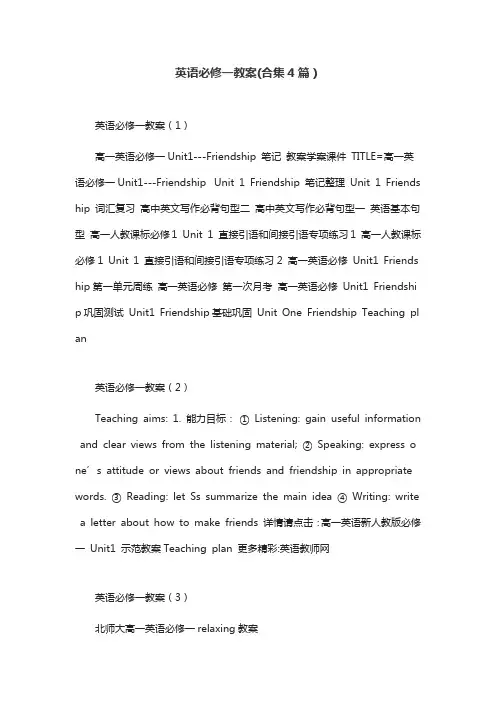
英语必修一教案(合集4篇)英语必修一教案(1)高一英语必修一Unit1---Friendship 笔记教案学案课件TITLE=高一英语必修一Unit1---Friendship Unit 1 Friendship 笔记整理Unit 1 Friends hip 词汇复习高中英文写作必背句型二高中英文写作必背句型一英语基本句型高一人教课标必修1 Unit 1 直接引语和间接引语专项练习1 高一人教课标必修1 Unit 1 直接引语和间接引语专项练习2 高一英语必修Unit1 Friends hip第一单元周练高一英语必修第一次月考高一英语必修Unit1 Friendshi p巩固测试Unit1 Friendship基础巩固Unit One Friendship Teaching pl an英语必修一教案(2)Teaching aims: 1. 能力目标:①Listening: gain useful information and clear views from the listening material; ②Speaking: express o ne’s attitude or views about friends and friendship in appropriate words. ③Reading: let Ss summarize the main idea ④Writing: write a letter about how to make friends 详情请点击:高一英语新人教版必修一Unit1 示范教案Teaching plan 更多精彩:英语教师网英语必修一教案(3)北师大高一英语必修一relaxing教案导语:编写教案要依据教学大纲和教科书。
从学生实际情况出发,精心设计。
以下是北师大高一英语必修一relaxing教案,供各位阅读和参考。
学习目标Students are to be able topredict what to hear.use the group of words related to stress.tell the ways to deal with the stress.教学流程学生背景升入高中后的第二节英语课。
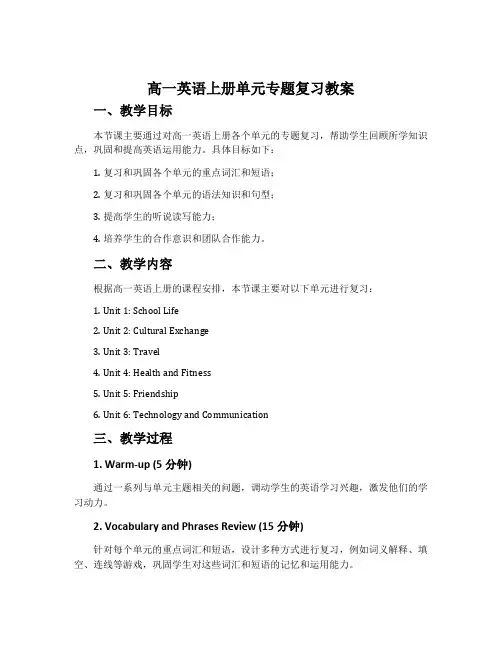
高一英语上册单元专题复习教案一、教学目标本节课主要通过对高一英语上册各个单元的专题复习,帮助学生回顾所学知识点,巩固和提高英语运用能力。
具体目标如下:1.复习和巩固各个单元的重点词汇和短语;2.复习和巩固各个单元的语法知识和句型;3.提高学生的听说读写能力;4.培养学生的合作意识和团队合作能力。
二、教学内容根据高一英语上册的课程安排,本节课主要对以下单元进行复习:1.Unit 1: School Life2.Unit 2: Cultural Exchange3.Unit 3: Travel4.Unit 4: Health and Fitness5.Unit 5: Friendship6.Unit 6: Technology and Communication三、教学过程1. Warm-up (5分钟)通过一系列与单元主题相关的问题,调动学生的英语学习兴趣,激发他们的学习动力。
2. Vocabulary and Phrases Review (15分钟)针对每个单元的重点词汇和短语,设计多种方式进行复习,例如词义解释、填空、连线等游戏,巩固学生对这些词汇和短语的记忆和运用能力。
3. Grammar Review (20分钟)通过复习每个单元的语法知识和句型,帮助学生理解和掌握各个单元的语法规则。
可以结合练习题、错误改正等方式进行讲解和巩固。
4. Listening Practice (15分钟)选取与各单元主题相关的听力材料进行听力训练,提高学生的听力理解能力。
可以通过听力填空、听力选择等方式进行,帮助学生更好地理解和运用所学知识。
5. Speaking and Reading Activities (20分钟)组织学生进行口语和阅读练习,增强他们的口语交流和阅读理解能力。
可以采用问答、小组讨论、朗读等方式进行,让学生积极参与,并给予合理的评价和指导。
6. Writing Practice (15分钟)提供与各个单元主题相关的写作题目,引导学生进行写作练习。
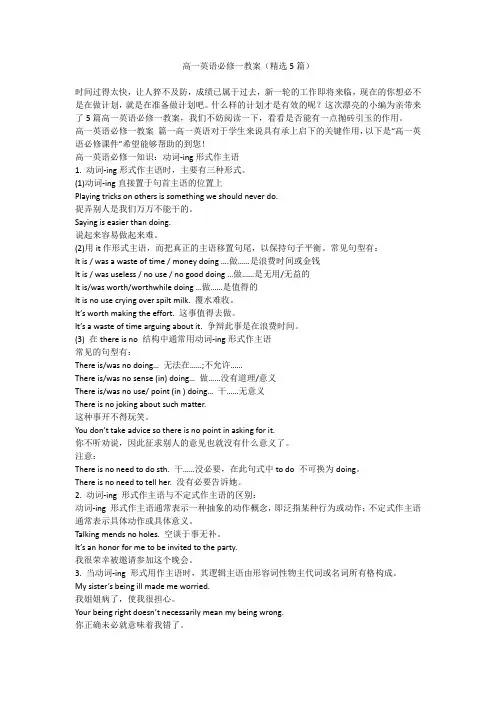
高一英语必修一教案(精选5篇)时间过得太快,让人猝不及防,成绩已属于过去,新一轮的工作即将来临,现在的你想必不是在做计划,就是在准备做计划吧。
什么样的计划才是有效的呢?这次漂亮的小编为亲带来了5篇高一英语必修一教案,我们不妨阅读一下,看看是否能有一点抛砖引玉的作用。
高一英语必修一教案篇一高一英语对于学生来说具有承上启下的关键作用,以下是“高一英语必修课件”希望能够帮助的到您!高一英语必修一知识:动词-ing形式作主语1. 动词-ing形式作主语时,主要有三种形式。
(1)动词-ing直接置于句首主语的位置上Playing tricks on others is something we should never do.捉弄别人是我们万万不能干的。
Saying is easier than doing.说起来容易做起来难。
(2)用it作形式主语,而把真正的主语移置句尾,以保持句子平衡。
常见句型有:It is / was a waste of time / money doing ….做……是浪费时间或金钱It is / was useless / no use / no good doing …做……是无用/无益的It is/was worth/worthwhile doing …做……是值得的It is no use crying over spilt milk. 覆水难收。
It’s worth making the effort. 这事值得去做。
It’s a waste of time arguing about it. 争辩此事是在浪费时间。
(3) 在there is no 结构中通常用动词-ing形式作主语常见的句型有:There is/was no doing… 无法在……;不允许……There is/was no sense (in) doing… 做……没有道理/意义There is/was no use/ point (in ) doing… 干……无意义There is no joking about such matter.这种事开不得玩笑。
2024年人教版高一英语必修一教案一、教学目标知识与技能:学生能够掌握本单元的核心词汇和短语,并能够在上下文中准确运用。
学生能够理解和运用本单元所学的重点语法结构,如现在完成时、直接引语和间接引语等。
学生能够读懂本单元的课文,并理解其中的主要内容和深层含义。
过程与方法:培养学生通过上下文推测词义的能力。
引导学生通过小组讨论和合作学习,提高解决问题的能力。
鼓励学生通过写作练习,巩固和拓展所学知识。
情感、态度和价值观:激发学生对英语学习的兴趣和热情。
培养学生的跨文化意识和国际视野。
引导学生形成积极向上的学习态度和人生观。
二、教学重点和难点教学重点:核心词汇和短语的掌握。
重点语法结构的理解和运用。
课文内容的理解和分析。
教学难点:现在完成时态的正确使用。
直接引语和间接引语的转换。
英语阅读理解的深入分析。
三、教学过程导入新课:通过展示与课文内容相关的图片或视频,激发学生的学习兴趣。
提问学生关于图片或视频的问题,引导学生用英语进行回答,为新课做铺垫。
简要介绍本课的学习目标和重点,让学生明确学习任务。
词汇学习:呈现本课的重点词汇和短语,通过例句让学生理解其含义和用法。
组织学生进行词汇记忆游戏或竞赛,巩固所学词汇。
引导学生通过上下文推测词义,提高词汇运用能力。
语法讲解与练习:详细讲解本课的重点语法结构,如现在完成时、直接引语和间接引语等。
通过例句和练习让学生熟悉语法规则,并能够在实际语境中运用。
组织学生进行小组讨论,解决语法练习中的疑难问题。
课文学习:让学生快速阅读课文,了解大意。
分段讲解课文,解释重点和难点句子。
组织学生讨论课文内容,提炼中心思想,理解作者的观点和态度。
综合运用:设计一些综合性的练习,如完形填空、阅读理解等,检验学生对本课内容的掌握情况。
鼓励学生用英语复述课文,提高他们的口头表达能力。
组织学生编写与本课主题相关的短文或对话,培养他们的写作能力。
四、教学方法和手段教学方法:采用任务型教学法,让学生在完成任务的过程中主动学习和探索。
必修第一册第三章复习教案第一部分,知识点梳理。
1. 词汇。
1) 单词。
apple 苹果。
banana 香蕉。
orange 橙子。
pear 梨。
grape 葡萄。
watermelon 西瓜。
pineapple 菠萝。
strawberry 草莓。
peach 桃子。
cherry 樱桃。
2) 词组。
a piece of 一片。
a cup of 一杯。
a glass of 一杯。
a bottle of 一瓶。
some juice 一些果汁。
How many...? 多少个/多少杯/多少瓶。
How much...? 多少钱/多少重量。
2. 语法。
1) 名词的复数形式。
一般情况下,在名词后面加-s构成复数形式,如,apple—apples,banana—bananas。
以s, x, ch, sh结尾的名词,加-es构成复数形式,如,box—boxes, glass—glasses。
以辅音字母+y结尾的名词,变y为i再加-es构成复数形式,如,cherry—cherries。
不规则变化,如,child—children, foot—feet。
2) 物主代词的用法。
形容词性物主代词,my, your, his, her, its, our, their。
名词性物主代词,mine, yours, his, hers, its, ours, theirs。
第二部分,练习题。
1. 选择题。
1) —How many ________ do you want?—I want two ________.A. apple; apple。
B. apples; apples。
C. apple; apples。
D. apples; apple。
2) There are some ________ on the table.A. banana。
B. bananas。
C. apple。
D. oranges。
3) —________ are these?—They are my ________.A. Who; book。
高中英语复习课教学设计一、教学任务及对象1、教学任务本教学设计针对的是高中英语复习课,旨在帮助学生巩固和深化已学过的英语知识,提高他们的英语听、说、读、写四项基本技能。
通过本次复习课,使学生能够系统地掌握英语语法、词汇、句型等知识点,提升英语语言运用能力,为高考做好充分准备。
2、教学对象本次教学设计的对象为高中学生,他们已经具备一定的英语基础,但在语法、词汇、句型等方面仍有待提高。
此外,学生们的学习兴趣和动机存在差异,因此在教学过程中,需要关注每个学生的学习需求,因材施教,激发学生的学习兴趣,提高他们的学习积极性。
二、教学目标1、知识与技能(1)掌握高中阶段英语语法、词汇、句型等知识点,提高英语语言运用能力;(2)能够运用所学知识进行日常交流,提高英语口语表达能力;(3)提高阅读理解能力,掌握一定的阅读技巧,提高阅读速度和准确率;(4)提升写作能力,能够根据题目要求撰写不同类型的文章;(5)培养良好的英语听力习惯,提高英语听力水平。
2、过程与方法(1)采用启发式、任务驱动式教学方法,引导学生主动参与课堂活动,提高学生的自主学习能力;(2)通过小组讨论、合作学习等形式,培养学生团队协作能力和沟通能力;(3)运用多媒体教学手段,创设丰富的语言环境,提高学生的学习兴趣;(4)设计多样化的练习题型,帮助学生巩固所学知识,提高解题能力;(5)注重学法指导,让学生掌握有效的学习方法和策略。
3、情感,态度与价值观(1)培养学生对英语学习的兴趣和热情,激发他们学习英语的内在动力;(2)培养学生积极向上的学习态度,使他们能够面对困难,勇于挑战,持续进步;(3)培养学生正确的价值观,使他们认识到英语学习的重要性,为未来的学习和工作打下坚实基础;(4)通过英语学习,拓展学生的国际视野,增强跨文化交际能力,提升综合素质;(5)培养学生热爱祖国、热爱人民、热爱社会主义的情感,树立民族自豪感。
三、教学策略1、以退为进在教学过程中,采用以退为进的教学策略,教师有意识地退一步,给予学生更多的自主学习空间。
高一英语单元复习教案单元复习教案高一英语unit 1 词组与句式1.add upadd…to…add toadd up to2…,upset and tired.3 .be concerned about/for/overshow concern about/for/overbe concerned in/withsth./sb. concernedconcerning…as far as…is concerned4.calmstillquietsilent5.while walking the dog,省略句:when,while,if ,unless,once,though等时间,条件,让步状语从句可省略相同主语/it﹢ be6.cheat sb. into doingcheat sb. of sth.cheat in the exam7.强调句:it is +强调部分+that 从句(区别:去it is…that 原句依然完整)还有do/does/did构成的强调8.stay awakestay up9.in order that /so thatin order toso as to10.far +比较级但far too+原级too muchmuch too11.it is the first time﹢现在完成时从句it was the first time +过去完成时从句the first time﹢过去时从句for the first time 独立状语12.it’s no good/no use/no point/no pleasure doing sth.have trouble/difficulty/fun doing sth.13.joinjoin inattendtake part in14.should/could/must have done15.go throughget through16.go outdoors/ upstairs/abroad17.find/make/feel it hard to do sth.make/call/name a b18.it is… before…it is not long before…19.suffer pain/loss/injurysuffer from 疾病/the war/earthquake/the poverty20.get on/along (well/badly) with sb./sth.21.with sb./sth. ﹢介词副词短语/形容词/ving/v.pp/不定式22.set down/set up/ set out/set about /set off23.power /force /energy /strength24.语法;直接引语和间接引语要注意---语序,代,动,状25.a series of …is…/two series of…are…26.作文:写建议注意格式first…secondly…thirdly…(分段陈述)unit2词组与句式1.more than +数字more than+ 名词more than +形容词/副词more than +动词more than +句子more a than bno more thannot more than2.voyagejourneytriptraveltour3.be native toa native of beijing4. the people presentthe present peoplefor the present /at present4.at the end ofin the endby the end of5.because /for /since /asbecause of =owing to =due to=as a result of=thanks to6.even if=even though=though=althoughe upcome up withcome acrosscome alongcome overcome aboutcome by/pass bycome out8.be based on9.make use of sth. to do sth.10. a number ofthe number of11.such asfor example12.虚拟语气o坚持insisto命令order,commando建议advise,suggest,propose,recommendo要求ask,request,require,demand13. play a part /role in14. recognize认出/承认15. but /however /yet /while必修一unit 3 知识点归纳1).prefer + sth.. prefer that从句(用should 虚拟)prefer doing to doing=prefer to do rather than do=would rather do than do=would do rather than do2)persuade sb. to/not to do=persuade sb. into doing/out of doingpersuade sb. of sth.使某人相信。
一、教学目标1. 知识目标:- 巩固并复习高中英语基础知识,包括词汇、语法、句型等。
- 提升学生对英语听说读写技能的综合运用能力。
2. 能力目标:- 培养学生英语思维习惯,提高英语实际应用能力。
- 增强学生的自主学习能力和团队合作精神。
3. 情感目标:- 激发学生学习英语的兴趣,树立自信心。
- 培养学生良好的学习态度和团队协作精神。
二、教学内容1. 词汇:复习高中阶段常用词汇,包括动词、名词、形容词、副词等。
2. 语法:复习高中阶段常用语法知识,如时态、语态、非谓语动词等。
3. 听力:提升学生听力理解能力,包括短对话、长对话、短文理解等。
4. 阅读:提高学生阅读速度和理解能力,包括记叙文、议论文、说明文等。
5. 写作:训练学生写作技巧,包括作文结构、表达方式、语法运用等。
三、教学方法1. 案例分析法:通过分析典型例题,帮助学生掌握知识点。
2. 小组讨论法:分组讨论,提高学生的团队协作能力和英语表达能力。
3. 任务驱动法:设置实际任务,让学生在完成任务的过程中巩固所学知识。
4. 互动教学法:教师与学生互动,激发学生的学习兴趣和积极性。
四、教学过程1. 导入- 复习上节课所学内容,检查学生对知识的掌握情况。
- 提出本节课的学习目标,让学生明确学习方向。
2. 词汇复习- 教师讲解重点词汇,包括词性、词义、用法等。
- 学生跟读、拼写、造句,巩固词汇记忆。
3. 语法复习- 教师讲解重点语法知识,结合例句进行讲解。
- 学生练习语法填空、改错等题型,巩固语法运用。
4. 听力训练- 播放听力材料,学生认真听并回答问题。
- 教师点评听力技巧,帮助学生提高听力水平。
5. 阅读理解- 学生阅读文章,完成阅读理解题目。
- 教师讲解解题技巧,帮助学生提高阅读速度和理解能力。
6. 写作训练- 学生根据要求进行写作,教师点评并给予指导。
- 学生互相批改作文,提高写作水平。
7. 总结与反思- 教师总结本节课所学内容,强调重点和难点。
高考英语六选四专项复习一、本节内容(一)六选四体裁一是描述性结构,主要介绍事物、问题或倾向的特点,因此时间、地点常是出题重点(记叙文);二是释意性结果,解释某一理论、学科、事物,主要用比喻、类比阐述(说明文);三是原因性结构,主要分析事物的成因,有客观的、主观的,也有直接的、间接的(说明文);四是比较性结构,把两个人或事物的功能、特点、优缺点进行对比(议论文);五是驳斥性结构,主要是先介绍一种观点,然后对其评论或驳斥,再分析其优缺点、危害性,最后阐明自己的观点(议论文)。
(二)选项特点1.主旨概括句(文章整体内容)2.过渡性句子(文章结构)3.注释性句子(上下文逻辑意义)(三)解题步骤1. 阅读全文,了解大意;2. 细读各个空的前后句,标记关键词;在阅读文章的开始部分、明确文章的基本话题以后,要阅读四个空的前后句,并将前后句中的解题线索,即关键词标记下来。
关键词包括句中的核心名词或名词词组(如带有形容词的名词词组),专有名词、时间数字、代词、连词等。
2. 阅读各个选项,尤其是选项的首句,标记关键词;3. 比较并匹配上述两类关键词,确定答案;4. 区分相似项;该题型选项大致可分为主旨概括句(文章整体内容)、过渡性句子(文章结构)和注释性句子(上下文逻辑意义)三类。
另外两个多余的干扰项也可以通过这三个特点来排除,例如主旨概括句要么过于宽泛要么以偏概全或偏离主题,过渡性句子不能反映文章的行文结构,注释性句子与上文脱节等。
5. 将确定的答案代入原文,看读起来是否通顺。
(四)衔接手段6选4考查的是语篇的连贯性和一致性,因此就要使用到各种达到连贯目的的各种衔接手段,即:词汇衔接、逻辑衔接、结构衔接。
1.若空格句出现在段首,则通常是段落主题句或承接上段的衔接句。
这句往往是对下面整个段落内容的概括和总结,反映整个段落的主旨和大意认真阅。
读后文内容,锁定线索信号词,然后在选项中查找相关特征词。
关注每段首尾句,了解大意知主题。
2.若空格句在段尾,则多属总结本段内容的总结句或引出下一段内容的过渡句。
A:在选项中看能否找到对前文整段的总结句。
如果在段尾提出主题,会用一些信号词如转折词引出来,正确答案中应有这样的特征词。
段尾通常是结论、概括性语句。
注意在选项中查找表示结果、结论、总结等的信号词,如therefore, as a result, thus, hence, in short, to sum up, to conclude, in a word等词语,选项中也可发现前文的同义词句。
B:与下一段开头是否有一定的衔接。
认真阅读下一段开头几句,看是否与选项的最后一句紧密连接起来。
分析与前文是转折或是对比关系。
此时要注意在选项中查找表示转折、对比的关联词,同时注意选项中所讲内容是否与前文在同一主题上形成对立、对比关系。
如果第一段的段尾是空白,要认真阅读,看此处是细节还是主题。
通常文章第一段要提出文章的主题。
3.若空格句在段中,则需根据空格前后的句子内容及逻辑关系来确定答案。
1:因果关系(Eg: As a result/ thus/therefore/so (such)…)因果关系主要指前后的句子有着原因和结果之间的关系,这种关系往往说明了前因后果或者前果后因等情况。
2: 转折关系(Eg: However/nevertheless/nonetheless/though/yet/in spite of/on the contrary /in contrast /by contrast/ in comparison/otherwise/not...but)转折关系主要指英语行文中后句对前句构成逆转逻辑关系。
如果空格前后两句话之间是逻辑上的逆转,则空格处很有可能是个转折逻辑的句子。
3:并列关系(Eg: first/second/third/to begin with/to conclude)并列关系主要指前后的句子间是平等的关系,可以互换位置。
4:递进关系(Eg: also/ furthermore/ similarly/ moreover/ in addition/what’s more)递进关系主要指英语行文中后句对前句是一种顺承逻辑关系。
如果空格前后两句话之间是逻辑上的层进关系,则空格处很有可能是个递进的句子。
5: 例证关系(Eg:such as /for examples/One of the examples is …)前后句的某句是为了证明另一句而举的例子。
例证的形式多样,但就其本质而言无非是思维上的形象(例子、类比等)和抽象(观点)的辩证关系,用到的思维过程无非就是基本的归纳(从例子到观点)和推理(从观点到例子)。
1.代词英语表达中代词出现的频率极高,代词的作用无非是指代前面提及的名词或形容词概念,巧妙利用这样的指代关系和根据代词的单复数差异可以准确而快速地解题。
例如it 可指代单数名词或整个句子;they或them指代复数名词;one指代单数可数名词;that指代不可数名词或句子;this指代单数名词或句子;these 或those指代前句的复数名词。
2.同义词/反义词英语前言后语之间往往有同义词、近义词、近义表达语甚至相同词汇的重复使用,这是我们解题的一个很好的判断线索。
其实就其本质而言,上文讲的代词和下文将涉及的上下义词和同一范畴词都是特殊的同义/近义词。
3.同一范畴词(上下义词)上下义词和同一范畴词就是前者包含了后者,或可以说后者是前者的一个子集。
利用前后句中这样的特殊的同义关系常常可以很轻松地解题。
你可以在选项中找到与此词汇最接近的词,从而达到快而准。
一般来说,上下文中词汇联系越接近,上下文的衔接关系越紧密。
【课堂精讲】Climate change and the flow of farm chemicals and coastal sediment (沉物) into the waters that wash over one of Australia's most significant nature areas, the Great Barrier Reef (大堡礁), are the biggest threats to its survival, according to a government report to UNESCO(联合国教科文组织) released on December 2.The report was intended to reassure UNESCO that those risks were well managed and thatthe reef should not be placed on an "in danger" list. (67)_________________________The report also ignores plans by the Queensland State government to allow the development of one of the world's biggest coal mines about 200 miles from the reef, and it denies the possibility that pollutants from the mine could damage the reef. Besides, it doesn't mention that the Queensland Parliament rejected laws to prevent land clearing. (68)_________________________Meanwhile, scientists reported that the reef had suffered the worst coral bleaching (珊瑚白化) and die-off ever recorded, with stretches of its northern reaches dead after the coral was bathed in warm summer waters. That's why the UNESCO World Heritage Committee (世界遗产委员会) has called for a long-term management plan to ensure the reef maintains the World Heritage status it received in 1981.The Queensland government commissioned (委托) a study to estimate the costs of achieving water quality targets that would significantly improve the reef's health.(69)_________________________That figure was sharply higher than the roughly $1.5 billion the state and federal governments said would be spent over the next decade on all measures to protect the reef.The federal and Queensland governments said the study's overall cost estimate included "some very expensive high-risk actions," like nearly $4.2 billion for measures against erosion in one valley to prevent the flow of sediment into the ocean. Removal of that big-ticket item brought the study's report closer into line financially with the government report to UNESCO.(70)_________________________ It is likely to draw sharp criticism from environmentalists.【Keys】BDFA【解题分析】1、首先通读全文,了解大意。